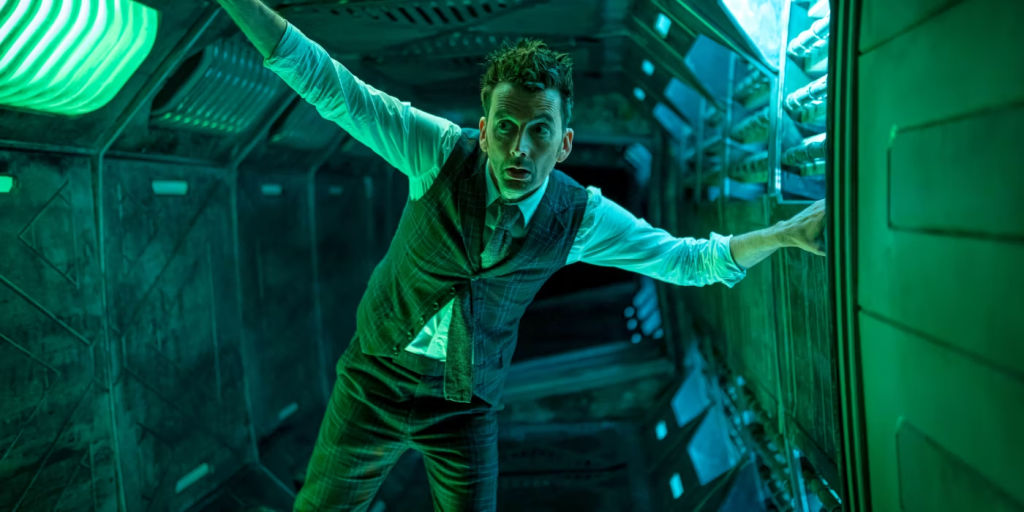It took me a while to come around to Doctor Who. As a kid, I was more terrified than entertained when my older cousins would put it on (I’m still working off the sleep debt I incurred at age eight after watching “The Empty Child”). When my friends all became fans of the show in middle school, I held out, scoffing at its silliness. Only recently have I begun to appreciate its theatrics, its ridiculous aliens, and the crazy lines the actors regularly have to sell. The upshot of all this is that, although I appreciate the Tenth Doctor, David Tennant’s much-loved incarnation of the Time Lord, I have no nostalgia for him whatsoever.
I was accordingly apprehensive about the recently aired 60th anniversary specials. These episodes, where Tennant stars as the Fourteenth Doctor and Catherine Tate reprises her role as companion Donna Noble, seemed like they would lean heavily on viewers’ fond memories of Series Four. There’s nothing wrong with nostalgia bait in itself, especially in episodes meant to celebrate the show’s history. New Doctor Who material is also still being produced, with the Fifteenth Doctor’s run slated to begin on Christmas, so any references to past seasons aren’t a pure cash grab in the manner of a Disney live-action remake. But since some of the show’s previous specials have emphasized spectacle and neglected the substance, I wondered if the return of Tennant and Tate would prove to be these specials’ main attraction, allowing them to get by without introducing any interesting new plot.

It turns out there was no reason to worry. After the slow start that was “The Star Beast,” the remaining episodes dreamed up by returning showrunner Russell T. Davies are everything Doctor Who should be: action-packed, silly, and great fun. “Wild Blue Yonder” is a classic mystery-on-board-a-spaceship story featuring alien monsters who go beyond the show’s typical behind-the-sofa scares into actual horror. Their ability to copy the appearances and memories of Donna and the Doctor makes for some fun mind games, and their failures to achieve human form, which involve plenty of sickening limb contortions, provide fascinating visuals (although today’s school-age Whovians will be losing lots of sleep as a result). The most impressive episode of the trilogy, “The Giggle,” makes efficient use of its runtime to tell an apt if blunt allegory for cultural polarization, give Fourteen his happy ending, and introduce Ncuti Gatwa’s new Doctor. It finds time for plenty of absurd hijinks, too, as only Doctor Who can. What other show on television would ever feature cannibalistic ventriloquist dolls and a climactic game of catch in the same episode?
These storylines were clearly written with care and not sacrificed in favour of nostalgia bait. In fact, I found myself improbably wishing for more callbacks. After taking the unprecedented step of having the Doctor regenerate with the face of a previous iteration, Davies does very little with that development. So many points from Tennant’s last tenure as Doctor could have been further explored here: his radical pacifism, for example, or the fact that he had resolved to start messing with the “fixed points” of history rather than let another person die. Other classic elements are underused, too. Fourteen isn’t as snarky as Ten was, and even the beloved dynamic between Donna and the Doctor—the prospective return of which was a huge draw for audiences—is only at the forefront in “Wild Blue Yonder.”
Instead, Donna spends a lot of time lecturing the Doctor on his trauma. She theorizes that his old face has returned so that he can find peace and settle down with her family to heal after all he’s suffered. It’s a sweet idea, but it feels misplaced here since the Fourteenth Doctor doesn’t seem particularly traumatized. He’s weary, sure, but he’s also at a comparatively good point in his sob story of a history: each episode of the specials sees him achieve a pretty unequivocal victory, and the last companion (Series 11-13’s Yaz Khan) didn’t even die. There are countless other points in the show where the Doctor would have been in greater need of a vacation, so it feels odd when so many characters insist that he take one right now.

The complete lack of loss or sacrifice throughout the episodes also means that their conclusion, which is much happier than is usual for Doctor Who, even verges on the saccharine. This run of episodes overall isn’t very good at either developing the Doctor’s character or reusing his established traits, which are the two directions you’d expect a retrospective-leaning program to take. Maybe a fulfilling emotional arc is too much to ask from an already ingenious and tightly-written script.
Judging by the ending of “The Giggle,” which leaves a back door open for David Tennant’s Fourteen to easily return to the show at any time, we’re likely to get the further callbacks I’m wishing for. It will be interesting to see whether Davies plays the Tennant card in the next series, defying the marketing that seems to be portraying Gatwa’s run as a big revamp of Doctor Who. The danger of overindulgent nostalgia is not entirely past, but this run of 60th anniversary specials, at least, has managed to strike an enjoyable balance between the old and the new.
